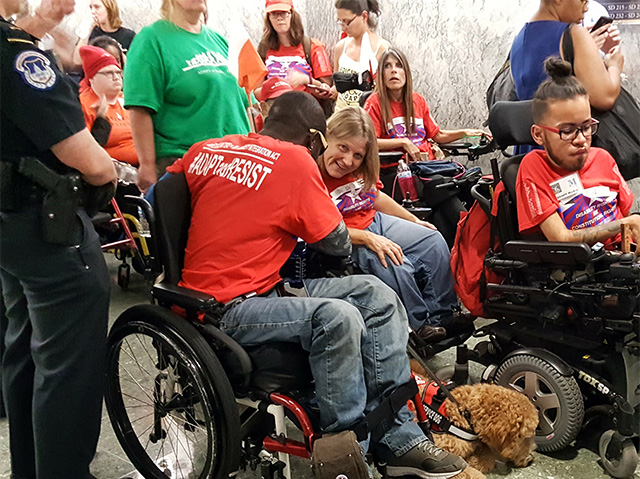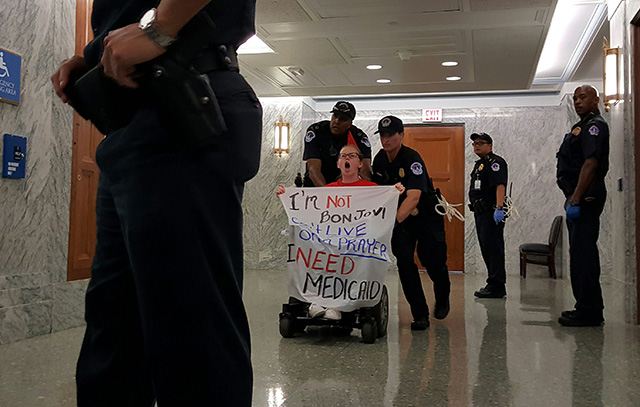
Part of the Series
Fighting for Our Lives: The Movement for Medicare for All
Support justice-driven, accurate and transparent news — make a quick donation to Truthout today!
This piece is part of Fighting for Our Lives: The Movement for Medicare for All, a Truthout original series.
On Tuesday, one day after raucous health care protests shook the Capitol, Republicans announced that there would be no vote on the latest iteration of Trumpcare, sponsored by Senators Lindsey Graham (R-South Carolina) and Bill Cassidy (R-Louisiana). The bill seemed to have met its end Monday night, when Senator Susan Collins announced she would be voting against the bill, due to its damaging effects on Medicaid. Tuesday, Republicans conceded defeat, and agreed to shelve the legislation.
But the war isn’t over.
With every loss, the Republicans have faced new obstacles. As the clock runs out on reconciliation — a process that would’ve allowed the bill to pass with a simple majority — time itself became their enemy. Next year, when reconciliation is back on the table, their agenda will be more crowded, with some Republicans hoping to use reconciliation to address tax reform.
But here’s what the Republicans have going for them: a comprehensive vision of the world they want, and a relentless will to fight for it.
 A protester in a wheelchair is arrested carrying a sign that reads: “I’M NOT BON JOVI, CAN’T LIVE ON A PRAYER, I NEED MEDICAID.” (Photo: Kelly Hayes)
A protester in a wheelchair is arrested carrying a sign that reads: “I’M NOT BON JOVI, CAN’T LIVE ON A PRAYER, I NEED MEDICAID.” (Photo: Kelly Hayes)
These bills are not episodic endeavors. Each health care bill forwarded by the Republicans has included major components of a larger Republican vision that includes the total destruction of all social safety nets and the elimination of legal protections for the marginalized. That vision may have been knocked back Tuesday, but it isn’t dead. The truth is, it cannot be killed with a single political defeat, and as Health Care for America Now has pointed out, the Republicans haven’t hit their September 30 deadline, and in politics, all things are possible.
Winning battle by battle, the left will eventually exhaust itself. You cannot play defense in a war of political vision. As anyone who has organized against Graham-Cassidy can tell you, people are already tired. Being menaced with the threat of millions losing health care, beating that threat back, only to face it again in a month or two — this cycle would wear anyone down.
So, what’s the answer? The long game has to be what we know our society needs: Medicare for All.
The majority of Americans support single-payer health care. Even establishment Democrats have begun to change their tune, with 15 senators endorsing Bernie Sanders’s Medicare for All plan. But supporting single-payer alone won’t secure health care, any more than believing in climate change will reduce carbon levels. We have to rewrite our society’s entire attitude toward health care. The war being waged against us and our survival, will not stop. And those who had reason to fear this bill still have great cause for concern in the months ahead. As writer and organizer Mariame Kaba — whose work helped propel the words “Medicare for All” into the public consciousness — told Truthout on Thursday, “It’s imperative that we understand the struggle for universal healthcare as an ongoing one. The GOP is committed to making sure that we never achieve this goal.”
Monday, during the health care protests in the Capitol, I met a woman named Nancy Harris, from Boise, Idaho. After serving for 32 years in the Navy, Nancy’s father had both insurance and a retirement fund, but neither were any match for the financial devastation of Alzheimer’s disease. Nancy has confirmed that she carries the gene for Alzheimer’s and says she’s experienced what could be early symptoms. She is currently undergoing testing. In the meantime, she said, “I want to know how my family will be able to care for me when the long-term options are so limited.” If a Republican health care bill passes, she says, “I will leave my husband bankrupt.” Unwilling to face the future on such terms, Nancy was one of the 181 people who committed to civil disobedience in the Capitol on Monday, giving us all a look at what it’s going to take to win the war: direct action and movement power.
 Housing Works community member and trans activist Josephine Perez, prior to her arrest at the Capitol. Just before her arrest, Josephine made a speech that connected the moment to other movements. (Photo: Kelly Hayes)
Housing Works community member and trans activist Josephine Perez, prior to her arrest at the Capitol. Just before her arrest, Josephine made a speech that connected the moment to other movements. (Photo: Kelly Hayes)
Nancy had come to the Capitol with a contingent of protesters from Housing Works, one of several groups that worked in concert to stage Monday’s protests. Another group which has played a crucial role in the health care fight this year is ADAPT. As a direct-action-oriented organization led by disabled people, ADAPT has staged brave and aggressive direct actions around the country. As I lost count of how many arrests I witnessed on Monday while covering the protests, I also lost track of how many wheelchairs I saw removed by police. One man was dragged away slowly, on his power scooter, because he had removed the battery as an act of passive resistance. Tuesday, after it was announced that there would be no vote on Graham-Cassidy, ADAPT continued its protests in Washington, DC, taking aim at Health and Human Services Secretary Tom Price, and demanding better services for the disabled.
We should all pay attention to the relentlessness of ADAPT’s organizing. They are providing a glimpse of what it’s going to take to win: a sustained fight, with a vision of what we want, in addition to what we don’t want. If we view the various iterations of Trumpcare as scattered, short-term nightmares, we will eventually tire and lose. The only way we will be prepared to fight these battles as they come is to live in the reality of our times: that we are at war, and in desperate need of culture building.
To truly defeat Trumpcare, in all its zombie forms, we must create a culture of care in the US, wherein caring for people who are sick and/or disabled is no longer a topic for debate, but a forgone conclusion. I know it seems like a distant goal. In June, as senators debated a version of Trumpcare that would have killed 29,000 people a year, I was astounded. Yes, we are living in a moment where officials lobby, in plain view, for actions that would kill 29,000 of us per year, and yes, in that same cultural moment, we must build an opposing vision — and triumph.
It’s a tall order, but it’s possible.
As Medea Benjamin told me on Monday, as the chaos of mass protest unfurled around us, “When they want us to go to war, there’s never any question about where we’ll find the money.” So, when we talk about ideas like universal health care, what we are really talking about is a war of priorities. A society is defined by what priorities it sets, and what it’s willing to do to meet those priorities. We know that the resources exist to provide care for everyone in the United States. We know that delivering those resources should be a much higher priority than dropping bombs abroad. But it’s not enough to know. We have to take a cue from Nancy Harris, and fight.
Democrats will congratulate themselves each time the Republicans stumble, but without movement momentum, a Republican health bill likely would have passed by now. In truth, establishment Democrats have, themselves, felt the pull of that momentum. Bernie Sanders’s bill would not have establishment co-signers like Kamala Harris and Corey Booker if the left hadn’t made it clear that it won’t get excited about anything less than single-payer. And when 60 percent of the country wants something, saying you want it too is the smart play — especially if you are someone who wants to be president someday.
So, the war goes on, and other battles will come. For many of us, participation has never felt optional. For Republicans, the evisceration of safety net programs and insurance protections remains a political imperative. They have a social and economic vision for the United States in which our suffering is normalized, and they will continue to fight for the world they want to live in. We must do the same.
A terrifying moment. We appeal for your support.
In the last weeks, we have witnessed an authoritarian assault on communities in Minnesota and across the nation.
The need for truthful, grassroots reporting is urgent at this cataclysmic historical moment. Yet, Trump-aligned billionaires and other allies have taken over many legacy media outlets — the culmination of a decades-long campaign to place control of the narrative into the hands of the political right.
We refuse to let Trump’s blatant propaganda machine go unchecked. Untethered to corporate ownership or advertisers, Truthout remains fearless in our reporting and our determination to use journalism as a tool for justice.
But we need your help just to fund our basic expenses. Over 80 percent of Truthout’s funding comes from small individual donations from our community of readers, and over a third of our total budget is supported by recurring monthly donors.
Truthout’s fundraiser ended last night, and we fell just short of our goal. But your support still matters immensely. Whether you can make a small monthly donation or a larger one-time gift, Truthout only works with your help.
